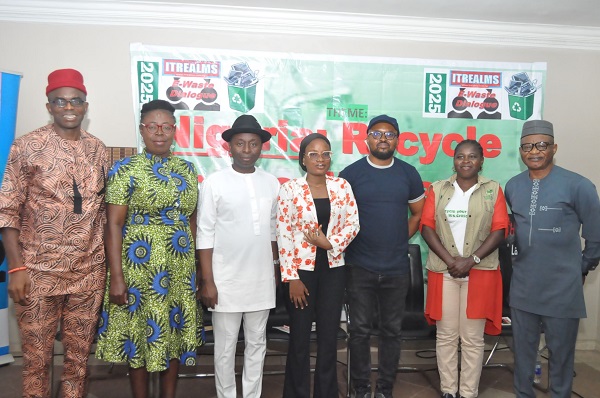From left: Host, Editor-in-Chief ITREALMS Media, Ogbuefi Remmy Nweke; Director Operations, ITREALMS Media, Lolo Nkem Nweke; Head Environment, Nigeria LNG Limited, Mr. Weyimi Metseagharun; Executive Assistant E-Waste Producer Responsibility Organisationof Nigeria, Azeezat Alabere; Assistant General Manager, Internet Exchange Point of Nigeria, Mr. Uchechukwu Ugwuanyi;Chief Scientific Officer, NESREA Lagos Liaison Office, Olaide Ayodele-Taiwo and Publisher, Political Economist Magazine, Mr. Ken Ugechie, during the 2025 ITREALMS E-Waste Dialogue with the theme: Nigeria: Recycle Your E-Waste It’s Critical in Lagos on 20-11-2025
Nigeria’s spiraling electronic waste problem has reached a critical juncture, demanding immediate, unified national action from all stakeholders, from top regulators to individual digital citizens.
This urgent call resonated profoundly at the 2025 ITREALMS E-Waste Dialogue in Lagos, where the nation’s foremost environmental agency issued a stark warning, buttressed by appeals from the event’s convener for a concrete national strategy.
Delivering the keynote address, the Director General/CEO of the National Environmental Standards and Regulations Enforcement Agency (NESREA), Professor Innocent Barikor, who was represented by the Chief Scientific Officer (CSO) at the Lagos State Liaison Office, Olaide Oyedele-Taiwo, underscored that the nation’s rapidly increasing generation of electronic waste is not merely an environmental nuisance but a burgeoning health crisis and a squandered economic opportunity.
“The demand for critical raw materials such as lithium, cobalt, and rare earth elements, vital components in our everyday electronics, is skyrocketing globally,” Barikor stated unequivocally. “Nigeria must position itself not just as a consumer, but as a key player in the circular economy by establishing efficient systems to recover these materials from discarded electronics, rather than allowing them to poison our communities.”
He warned of the dire consequences of informal e-waste recycling, where hazardous materials like lead, mercury, and cadmium are released into the environment, posing severe health risks. “When you don’t recycle your e-waste responsibly, it’s not just clutter; it’s a silent killer lurking in our landfills and informal dumps,” he said, making a passionate plea for immediate behavioral change.
Earlier in the day, Ogbuefi Remmy Nweke, Group Executive Editor of ITREALMS Media Group and Convener of the ITREALMS E-Waste Dialogue, set the stage by extending a warm welcome to a distinguished array of guests, industry leaders, and regulators. He highlighted the significant honor of hosting representatives from key stakeholders including NESREA, the Nigerian Communications Commission (NCC), ALTON, IXPN, NLNG and EPRON among others, emphasizing that their collective presence signaled the e-waste challenge as a national priority.
Nweke traced the journey of the ITREALMS E-Waste Dialogue, noting its evolution over five years. “Five years ago, we began this Dialogue to foster awareness. Today, the conversation must evolve. We have moved beyond merely acknowledging the problem; Nigeria now generates an estimated 1.2 million tonnes of e-waste annually. This burden demands immediate, unified, and practical solutions.”
He explained that this sobering reality informed the blunt and focused theme for the year: “Nigeria: Recycle Your e-Waste … It’s Critical!”
Nweke described this theme as “A call to action. It is a demand for a concrete national strategy. It is an appeal for every digital citizen to take personal responsibility.”
He also previewed the subsequent high-powered panel session, set to dissect the roles of various stakeholders in transforming the crisis into a circular economic opportunity.
Professor Barikor, in his keynote, further cemented the federal government’s unwavering commitment to the full implementation of the Extended Producer Responsibility (EPR) programme in the Electrical and Electronics sector.
This initiative, he explained, places the onus on producers and manufacturers to manage the end-of-life cycle of their products, from collection to recycling.
“The National Environmental (Electrical and Electronics) Sector Regulations are not merely guidelines; they are enforceable laws designed to ensure accountability,” Barikor asserted, signaling a firmer stance from the regulatory body. He indicated that NESREA would intensify its efforts to ensure compliance, stressing that deliberate disregard for these regulations would face stringent enforcement.
Before concluding, Nweke underscored a crucial holistic perspective: “E-waste management is not just an environmental issue; it is a public health, economic, and national security issue.” He affirmed the Dialogue’s mission to leave the event with actionable policy recommendations that will protect Nigeria’s environment and future generations.
Professor Barikor concluded his address by challenging every attendee to become “e-waste ambassadors,” urging them to champion proper e-waste disposal and recycling, transforming it from a niche environmental concern into a daily habit for every Nigerian.


Comment here